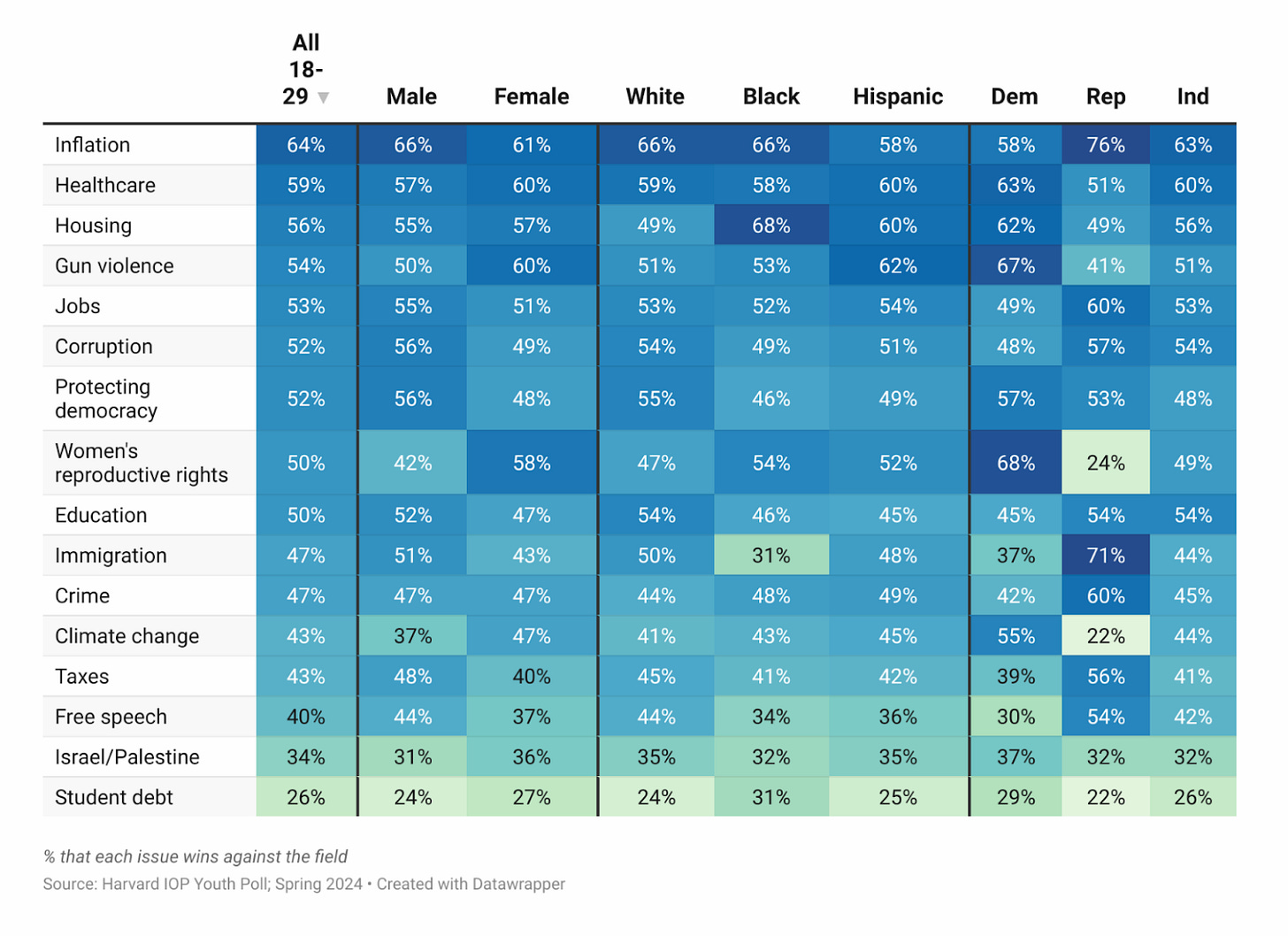The Daily Agenda: First-time voters weigh in on elections
A new survey shows that half of young adults plan to vote in the presidential election ... We talked with UA freshmen about their plans and concerns ... No more middle school for TUSD?
With the start of the University of Arizona’s fall semester just a few weeks away, many students are gearing up not only for classes, but also to vote in their very first presidential election.
More than half of young adults ages 18 through 29 said they’d be voting in the November General Election, according to the Harvard Youth poll released earlier this year by the Institute of Politics at the Harvard Kennedy School.
Very few of them, only 9%, said the country was headed in the right direction. They cited economic concerns and reproductive freedom as key issues, and the UA students surveyed by the Tucson Agenda ahead of the primary election echoed those concerns.
“Voting is important for young adults because the policies implemented are things that the youth have to deal with,” said UA freshman Olivia Carrol.
Carrol is one of two-dozen incoming freshmen who responded to our survey and talked with Angelina about the upcoming election and their plans when it comes to voting.
In Pima County, 52,183 young people ages 18 through 24 are registered to vote, making up a little more than 8% of registered voters, according to Uplift Campaigns.
Carrol said that it’s especially important for young voices to be heard, because the people in power are typically so much older and have very different perspectives.
UA student Taylor Gray echoed this sentiment, saying the country is “largely run by old people.”
Generational divisions are marked by varying beliefs, backgrounds, and knowledge, and social media plays a part in widening the generational divide, with terms like Gen Z, Millennials, and Boomers helping to perpetuate stereotypes about each generation.
“Young adults are generally more open to change,” said Luis Angel Rodriguez, highlighting the impact of this divide.
These local, first-time voters are concerned about many of the issues dividing the country, with their main concerns being reproductive freedom and the economy. Other worries include international conflicts, gay rights, climate change, education, healthcare, immigration, and Project 2025.
“Many people fought for their rights in this country, and we have to keep this place the best it can be, especially considering how hard it was for our ancestors to get here,” said Ryan Donziger,18.
As prices in the U.S. continue to rise, young adults are learning about the cost of living and how it compares to older generations. Many fear they’ll never be able to purchase a home in their lifetime and want to build a better future.
“I am most concerned about the economic situation our country is in as well as the racial divide in our country,” said Devin Lewis, 18.
The good news is, young people are taking their future into their hands by voting, with some getting even more civically involved. Maho said he hosted a voter registration drive at his school and spoke to representatives about his concerns on certain issues. J.R. Borntree, another incoming freshman, said he started working at a polling station in March.
When it comes to the places young voters consume news, outlets including the New York Times, CNN, The Washington Post, The Wall Street Journal and Ballotpedia were at the top of the list for the UA students who took our survey.
But those aren’t the only place they’re getting their news.
“I get it from news sources and videos online. I also watch interviews of candidates and have seen discourse between candidates as well,” said Michal Maho.
First-time voters also get information from social media platforms like Instagram, TikTok, Reddit, and X. However, these platforms can be challenging when it comes to finding reliable information because of the vast amounts of unvetted information.
Large media companies have significant followings on these platforms, but regular people can just as easily create videos that appear authentic and spread rapidly through algorithms.
“Some on social media like to make you think things are hopeless, but every vote matters,” said Gray. “I want to participate in deciding who is in charge of the government at the local, state, and national levels.”
But not all young people are aware of the impact their vote can have on society and given that many get their information from social media, students worry that they’re easy targets for misinformation.
“I am really concerned about the media literacy of the youth,” said Alexis Martinez. “Many young people don’t take the time to dig deeper into the news they come across.”
For some young voters, casting a ballot is a milestone on par with moving out and attending college, with Carrol saying she believes voting is a rite of passage.
For others, it represents a little bit more.
“I think about that old saying, ‘Be the change you want to see in the world.’ I want to take action and be that change,” said Martinez.
We love talking to young voters and it’s even better when we have young journalists on our team to report on these types of stories. Upgrade to a paid subscription so we can keep providing opportunities to students and new grads.
Shaking things up: Tucson Unified School District’s governing board is looking to test out a program that will keep 6th graders in elementary schools, the Tucson Sentinel’s Blake Morlock writes. The board discussed the program back in October, after the district’s research revealed that 6th graders do better in elementary school environments. They’ll vote on a final approval during tomorrow’s special meeting to pilot the program in 10 elementary schools.
Monsoon madness: If it feels like a particularly wet monsoons season, that’s because it is. Tucson is two inches above average rainfall for the season, Arizona Public Media’s Hannah Cree reports. Tucson had received almost four inches of rain through Friday, according to the National Weather Service. This means that the Tucson area only needs about two more inches of rain to reach normal accumulation totals for the season, which ends on September 30.
Clapping back: Pima County Attorney Laura Conover addresses the latest pieces of misinformation about her time in office in an opinion piece for the Arizona Daily Star. Conover writes that she provided the Star with photographic evidence that provides context for the lower number of diversion participants a former employee referenced in a letter last week. She also responded to a letter written by a domestic violence victim in support of Conover’s opponent, Mike Jette, saying that there wasn’t enough evidence to charge the woman’s abuser with a felony or even a misdemeanor.
Downsizing: Tucson furniture chain Sam Levitz is closing three of its four stores, KGUN reports. The company’s president, Sam Levitz, announced the closure of the Oro Valley location and said that two other stores will close on or after September 18. The Orange Grove location is the only location that will remain open, but Levitz said the company’s future “is yet to be determined” by management.
Big business: Pima County JTED’s new multi-million dollar health and medical center is opening this week, the Star’s Jessica Votipka reports. The $24 million Mel and Enid Zuckerman Center for Health and Medical Careers will house the licensed nursing assistant, medical assistant, health care foundations, pharmacy technician and social and mental health technician programs. The two-story building takes up 50,000 square feet of space at the south side JTED at The Bridges Campus.
Sounds good: The Santa Cruz County Sheriff’s Office is receiving $4.9 million in new communications equipment, including portable and vehicle radios, the Nogales International’s Angela Gervasi writes. The equipment is funded through several large-scale grants and is set to arrive at the end of the calendar year or start of 2025. While the sheriff’s office has never lost communication between deputies and dispatchers because of its outdated equipment, the discontinued system is no longer replaceable or repairable.
2,295: The number of registered Pima County voters between the ages of 18 and 24 who have returned their primary election ballots, representing 4.4% turnout, according to Uplift Campaigns.











